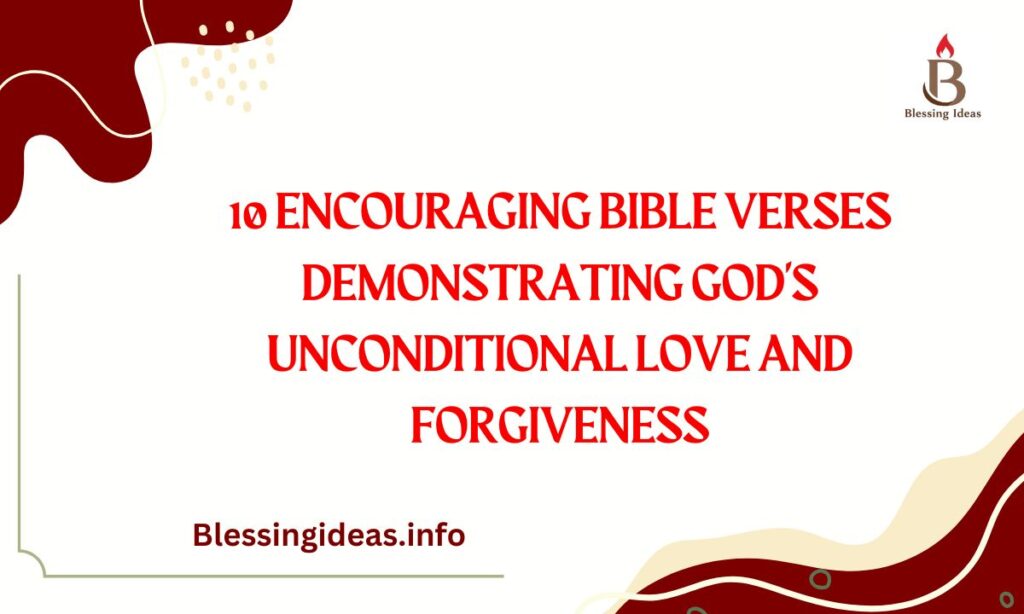Life often feels overwhelming. We face disappointments, make mistakes, and struggle with feelings of inadequacy. In these moments of weakness and failure, we may wonder if God still loves us or if His patience with our shortcomings has run out. The beautiful truth of Scripture reveals something different entirely. God’s love is not based on our performance, and His forgiveness is not limited by our failures.
Throughout the Bible, from Genesis to Revelation, we see countless examples of God’s unwavering love for His people. Even when they turned away from Him, broke His commandments, and chose their own paths, God remained faithful. His love is described as steadfast, everlasting, and unconditional. His forgiveness is complete, transformative, and available to all who seek it.
Romans 8:38-39 (ESV)
“For I am sure that neither death nor life, nor angels nor rulers, nor things present nor things to come, nor powers, nor height nor depth, nor anything else in all creation, will be able to separate us from the love of God in Christ Jesus our Lord.”
Paul’s declaration in Romans chapter eight stands as one of the most powerful assurances in all of Scripture. Written to believers in Rome, these verses come at the climax of Paul’s explanation about life in the Spirit and God’s eternal purpose for His people.
The apostle Paul understood separation from God intimately. Before his conversion on the Damascus road, he had persecuted Christians with zealous hatred. He supervised the stoning of Stephen and imprisoned countless believers. Yet when Jesus appeared to him in blinding light, Paul experienced the transformative power of God’s love and forgiveness.
Jeremiah 31:2-3 (ESV)
“Thus says the Lord: ‘The people who survived the sword found grace in the wilderness; when Israel sought for rest, the Lord appeared to him from far away. I have loved you with an everlasting love; therefore I have continued my faithfulness to you.'”
These verses come during one of the darkest periods in Israel’s history. The nation had repeatedly turned away from God, worshiped idols, and ignored the warnings of prophets like Jeremiah. As a consequence, they faced invasion, destruction, and exile to Babylon.
Yet in the midst of judgment, God speaks words of incredible tenderness. The “sword” refers to the military conquest they endured, and those who “survived” were the remnant who lived through the devastating war. Even in their punishment, God describes His people as finding “grace in the wilderness.”
Lamentations 3:22-23 (ESV)

“The steadfast love of the Lord never ceases; his mercies never come to an end; they are new every morning; great is your faithfulness.”
Lamentations emerge from the ashes of Jerusalem’s destruction. The city lies in ruins, the temple has been demolished, and the people have been carried into exile. The book is a funeral dirge, a collection of poems mourning the devastation of God’s judgment upon sin.
Yet in the middle of this overwhelming grief, we find these verses of hope. They appear in chapter three, right at the heart of the book, like a ray of sunlight breaking through storm clouds. The author, traditionally identified as Jeremiah, finds reason to hope even in the depths of despair.
The Hebrew word for “steadfast love” is “chesed,” one of the richest terms in the Old Testament. It encompasses God’s covenant loyalty, His faithful love that refuses to let go. This love doesn’t cease (Hebrew: tamam) – it doesn’t come to an end, finish, or be consumed. Even when everything else fails, God’s love remains constant.
Isaiah 41:10 (ESV)
“Fear not, for I am with you; be not dismayed, for I am your God; I will strengthen you, I will help you, I will uphold you with my righteous right hand.”
Isaiah prophesied during turbulent times when the northern kingdom of Israel had already fallen to Assyria, and Judah faced similar threats. The people lived in constant fear of invasion, political upheaval, and economic uncertainty. Into this atmosphere of anxiety, God speaks words of profound comfort and assurance.
The command “Fear not” appears throughout Scripture because fear is one of humanity’s greatest enemies. Fear paralyzes faith, distorts perspective, and robs us of peace. God doesn’t dismiss our fears as imaginary or trivial – instead, He provides reasons why fear is unnecessary when we belong to Him.
Psalm 34:18 (ESV)
“The Lord is near to the brokenhearted and saves the crushed in spirit.”
Psalm 34 bears the historical note that David wrote it when he pretended to be insane before Abimelech. This refers to the incident recorded in 1 Samuel 21 when David, fleeing from King Saul, sought refuge among the Philistines. Fearing for his life, he acted like a madman to escape danger.
From this context of desperation and fear, David writes about God’s nearness to the brokenhearted. The word “brokenhearted” in Hebrew suggests hearts that are shattered, fractured by pain, disappointment, or loss. These aren’t merely sad hearts but hearts that feel completely broken beyond repair.
God’s response to brokenheartedness is nearness. While others might withdraw from someone in emotional pain, finding their grief uncomfortable or inconvenient, God draws closer. The Hebrew word for “near” suggests intimate proximity, like a friend who sits beside you in silence during your darkest hour.
John 3:16 (ESV)
“For God so loved the world, that he gave his only Son, that whoever believes in him should not perish but have eternal life.”
Perhaps no verse in the Bible is more famous or more foundational to the Christian faith than John 3:16. These words, spoken by Jesus to Nicodemus during a nighttime conversation, encapsulate the entire gospel message in one powerful sentence.
The verse begins with the motivation for God’s action: His love for the world. The Greek word “kosmos” doesn’t refer merely to the physical planet but to the entire human race in all its diversity, rebellion, and need. This includes every culture, every nationality, every social class, and every individual who has ever lived.
Matthew 11:28-30 (ESV)
“Come to me, all who labor and are heavy laden, and I will give you rest. Take my yoke upon you, and learn from me, for I am gentle and lowly in heart, and you will find rest for your souls. For my yoke is easy, and my burden is light.”
These words from Jesus come at a significant moment in His ministry. He had been teaching and performing miracles, yet many people remained skeptical or hostile. The religious leaders criticized Him, and even John the Baptist had sent messengers asking if Jesus was truly the Messiah.
In this context, Jesus issues one of the most beautiful invitations in all of Scripture. He addresses “all who labor and are heavy laden” – a description that encompasses everyone who feels burdened by life’s demands, weighed down by sin’s guilt, or exhausted by religious rules and expectations.
1 John 1:9 (ESV)
“If we confess our sins, he is faithful and just to forgive us our sins and to cleanse us from all unrighteousness.”
The apostle John wrote this letter to believers who were struggling with the reality of sin in their lives. Some false teachers had suggested that Christians could reach a state of sinless perfection, while others claimed that sin didn’t matter for those who had been saved. John addresses both errors with balanced truth.
The verse begins with a conditional statement: “If we confess our sins.” The Greek word for “confess” (homologeo) literally means to “say the same thing” – to agree with God about the nature and seriousness of our sin. Confession isn’t just admitting wrongdoing but aligning our perspective with God’s perspective.
2 Timothy 2:13 (ESV)

“If we are faithless, he remains faithful—for he cannot deny himself.”
Paul wrote these words to his spiritual son Timothy during his final imprisonment in Rome. Facing imminent death, Paul wanted to encourage Timothy to remain faithful despite persecution and hardship. In this context, he reflects on the character of God and its implications for believers.
The verse presents a stark contrast between human inconsistency and divine reliability. “If we are faithless” acknowledges the reality that believers sometimes struggle with doubt, fear, and spiritual inconsistency. The Greek word for “faithless” (apisteo) can mean lacking faith or being unfaithful.
Philippians 1:6 (ESV)
“And I am sure of this, that he who began a good work in you will bring it to completion on the day of Jesus Christ.”
Paul wrote Philippians from prison, yet the letter overflows with joy and confidence. Despite his circumstances, Paul maintains unwavering faith in God’s purposes and promises. This verse expresses one of his strongest convictions about God’s work in believers’ lives.
Paul begins with confident assurance: “I am sure of this.” The Greek word (peitho) conveys complete confidence based on solid evidence. Paul isn’t expressing hopeful optimism but settled conviction based on his understanding of God’s character and promises.
Reflection Questions
Personal Connection with God’s Love: When you consider Romans 8:38-39, what specific fears or circumstances in your life have made you question God’s love? How does Paul’s comprehensive list of things that cannot separate us from God’s love speak to your current situation?
Learning from Biblical Examples: Reflecting on Jeremiah 31:2-3 and the story of Israel’s exile, how do you see God’s “everlasting love” working even during difficult periods of your own life? What parallels can you draw between Israel’s wilderness experience and your own spiritual journey?
Finding Hope in Suffering: Lamentations 3:22-23 emerges from the depths of national tragedy and personal grief. How can the promise that God’s mercies are “new every morning” change your perspective on recurring struggles or persistent challenges in your life?
Overcoming Fear with Faith: Isaiah 41:10 addresses our tendency toward fear and discouragement. What specific promises in this verse speak most powerfully to your current anxieties? How might believing that God will “uphold you with his righteous right hand” change the way you approach daily challenges?
Experiencing God’s Nearness: Psalm 34:18 promises God’s nearness to the brokenhearted. Can you recall a time when you felt emotionally or spiritually crushed? How did you experience (or how might you experience) God’s presence during such times?
Understanding Salvation’s Gift: John 3:16 presents the gospel in its simplest form. How does understanding that God’s love motivated Christ’s sacrifice affect your sense of personal worth and security? What does “eternal life” mean to you beyond just duration?
Accepting Jesus’s Invitation: In Matthew 11:28-30, Jesus invites the weary to find rest in Him. What specific burdens are you currently carrying that feel too heavy? How might taking Christ’s “easy yoke” change your approach to these burdens?
Practicing Confession: According to 1 John 1:9, confession leads to both forgiveness and cleansing. How comfortable are you with honest confession of your sins to God? What difference might it make to know that God’s forgiveness is guaranteed based on His faithfulness rather than your performance?
Trusting in God’s Faithfulness: 2 Timothy 2:13 assures us that God remains faithful even when we are faithless. How does this truth encourage you during seasons of spiritual struggle or doubt? What does it mean to you that God’s faithfulness is rooted in His unchanging nature?
Growing in Spiritual Confidence: Philippians 1:6 promises that God will complete the good work He has begun in you. How does this assurance affect your attitude toward spiritual growth and sanctification? In what ways can you cooperate with God’s ongoing work while trusting in His ultimate faithfulness to complete it?
Conclusion
These ten Bible verses form a beautiful tapestry of God’s unconditional love and unlimited forgiveness. From the Old Testament prophets who proclaimed God’s everlasting love during Israel’s darkest hours to the New Testament apostles who testified to the transformative power of Christ’s sacrifice, Scripture consistently reveals a God who loves beyond human comprehension and forgives beyond human deserving.
The verses span different historical contexts, literary genres, and human situations, yet they unite around common themes. God’s love is not conditional on human performance. His forgiveness is not limited by the severity of human sin. His faithfulness is not affected by human inconsistency. His promises are not dependent on human worthiness.






